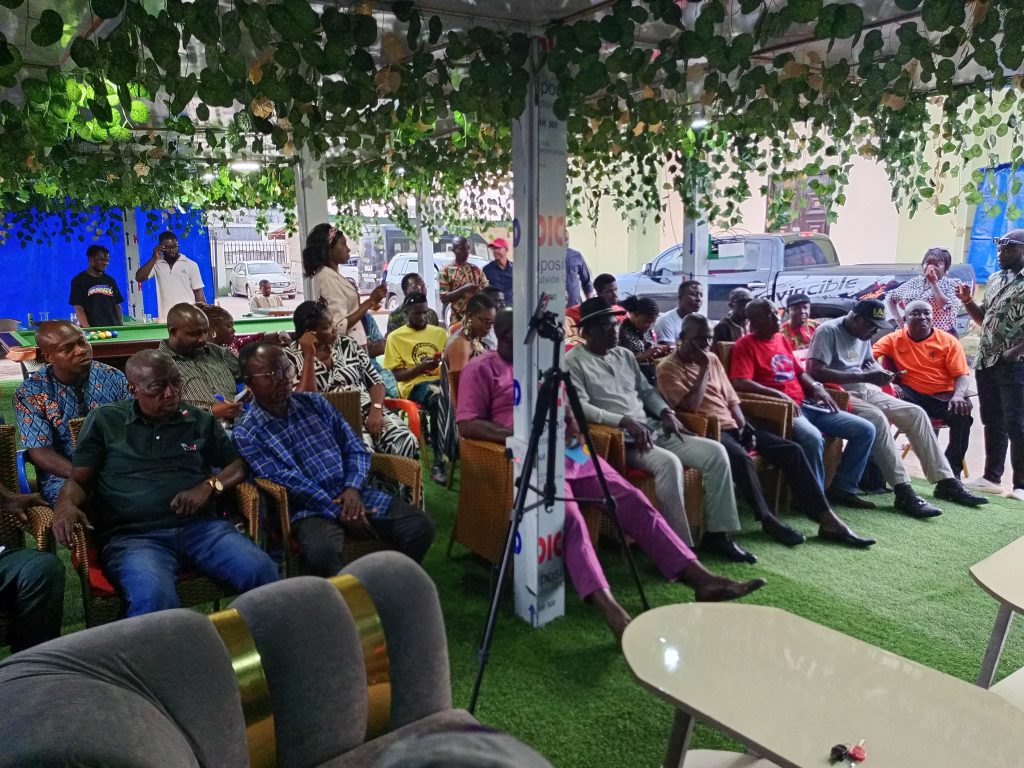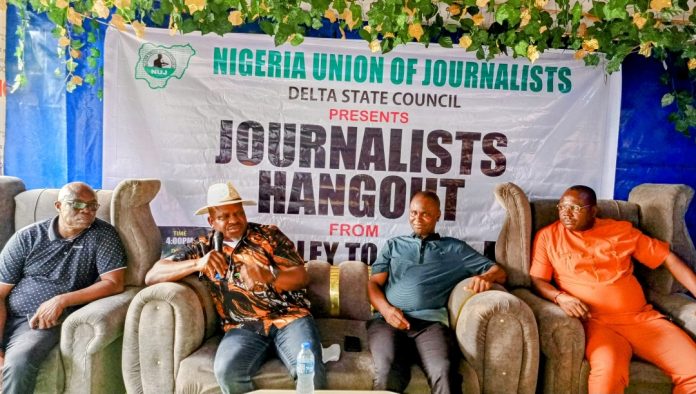Asaba, Nigeria — Delta State Commissioner for Works (Urban and Highways), Comrade Rueben Yakubu Izeze, reaffirmed the administration’s commitment to delivering durable road projects that will last over 20 years. Speaking at the 12th edition of the Journalists Hangout, tagged “From Parley to Party,” he emphasized that the design and supervision of road projects have been improved under Governor Sheriff Oborevwori’s administration.
The event, organized by the Delta State Council of the Nigerian Union of Journalists, provided a platform for Izeze to highlight the administration’s efforts to ensure quality road construction. According to him, the current administration has adopted a new design philosophy to prevent issues like poor drainage and substandard road durability.
Izeze noted that he has spent the past year focusing on supervising road projects to ensure contractors adhere to specifications. “I do not attest to any certificate unless I visit the site myself,” he said, stressing his hands-on approach to overseeing projects. Contractors have been instructed to adhere strictly to design standards, with the Commissioner himself making site visits to confirm compliance.
The Commissioner referenced the quality of roads constructed in Warri by former Bendel State Governor, Samuel Ogbemudia, as an example of the standard the administration aims to achieve. “I have the philosophy of Ogbemudia roads because even after many years, his roads have stood the test of time. We want to deliver legacy roads that will serve Deltans for decades.”
Izeze further explained that the design concept for roads has shifted away from standard Google map designs. “Our new design starts with detailed site visits. We want to see where the drainage leads, not just lines on a map,” he said. The goal is to avoid “mosquito drains”—drains without proper discharge points that contribute to flooding.
The Commissioner outlined his approach to ensuring accountability among contractors, stating that contractors must adhere to specifications or be asked to redo their work. “It is no longer business as usual. Contractors now understand that they must deliver projects as specified, or they will be held accountable,” he said.
He noted the administration’s strategy of regularly inspecting projects before they are presented to the state tenders board, ensuring the roads meet high standards and will endure for over 20 years.
Comrade Izeze acknowledged that the Department of Urban and Highways is responsible for larger projects across the state. He highlighted ongoing work in Warri, where the state has engaged Julius Berger to deliver significant projects promptly. “The governor has promised to transform Warri, and progress is already visible with the construction of pillars for new infrastructure.”
The Commissioner also addressed the administration’s commitment to completing projects inherited from previous administrations. “We have made substantial progress on projects like the Kwale-Beneku Bridge, the Ibusa/Okpanam Bypass, and the Ohoror/Bomadi Bridge,” he said. Despite the challenges, the government has ensured the continuity of these projects, with some already completed and commissioned.
One of the major undertakings is the Ode-Itsekeri trans-Warri bridge, a project that has been in progress since 2006. “Past administrations have struggled to complete this bridge, but His Excellency, Sheriff Oborevwori, is committed to finishing it. The contractor has assured us of its completion by May 2025,” Izeze revealed.
In addition to completing inherited projects, the Commissioner highlighted new road initiatives approved by the State Executive Council. This includes addressing long-standing complaints about the Sokoh Estate road in Effurun. “The governor has insisted that the new design must ensure no return to repairs even after his tenure,” Izeze said, stressing the importance of durability.
The Commissioner also spoke on the need for realistic expectations about road construction. He pointed out that not all villages need road projects unless they offer significant economic value. “Not every village requires a road. We must consider the natural environment and focus on projects that have a real impact,” he said.
He stressed the importance of engaging communities to understand their actual needs, noting past failures where projects did not match local priorities. “We cannot impose projects on communities without consulting them. Development must be people-oriented and economically beneficial,” he added.
Reflecting on national issues, Izeze criticized the inconsistency in Nigeria’s development plans, citing poor execution of rail infrastructure and energy projects. “Nigeria is a third-world country, and most of our policies are not thought out. We are excellent planners, but we do not follow through,” he remarked.
In response, Delta State Chairman of the Nigerian Union of Journalists (NUJ), Comrade Churchill Oyovwe, expressed gratitude for the Commissioner’s participation. He stated that the Journalists Hangout is designed to foster friendly discussions with stakeholders on their contributions to society, rather than serve as a platform for probing.
The event allowed for open dialogue between the media and the administration, highlighting the strides made in infrastructure under Governor Oborevwori’s leadership.




